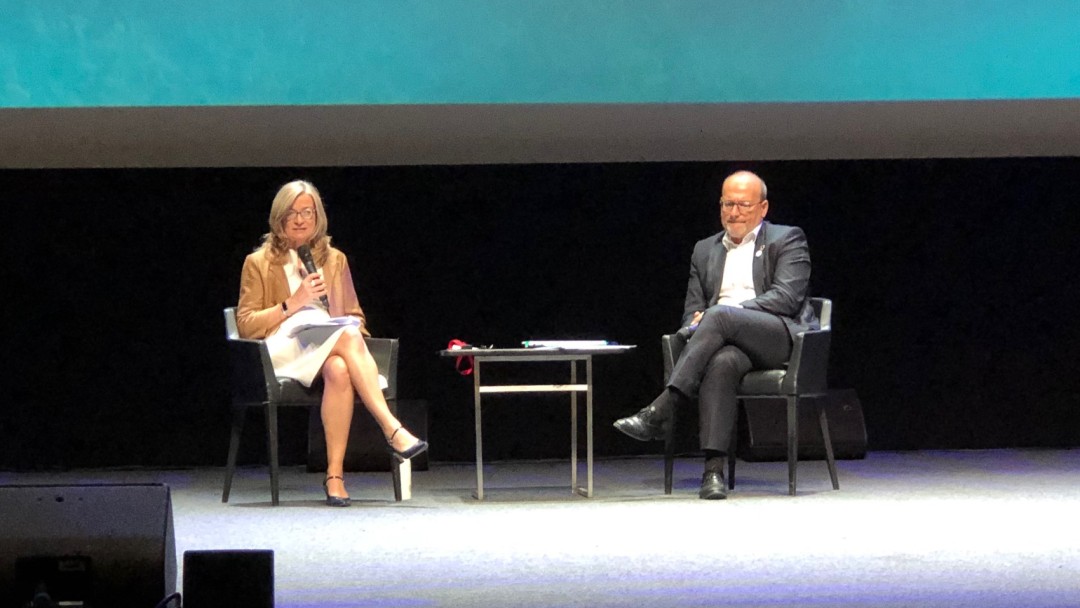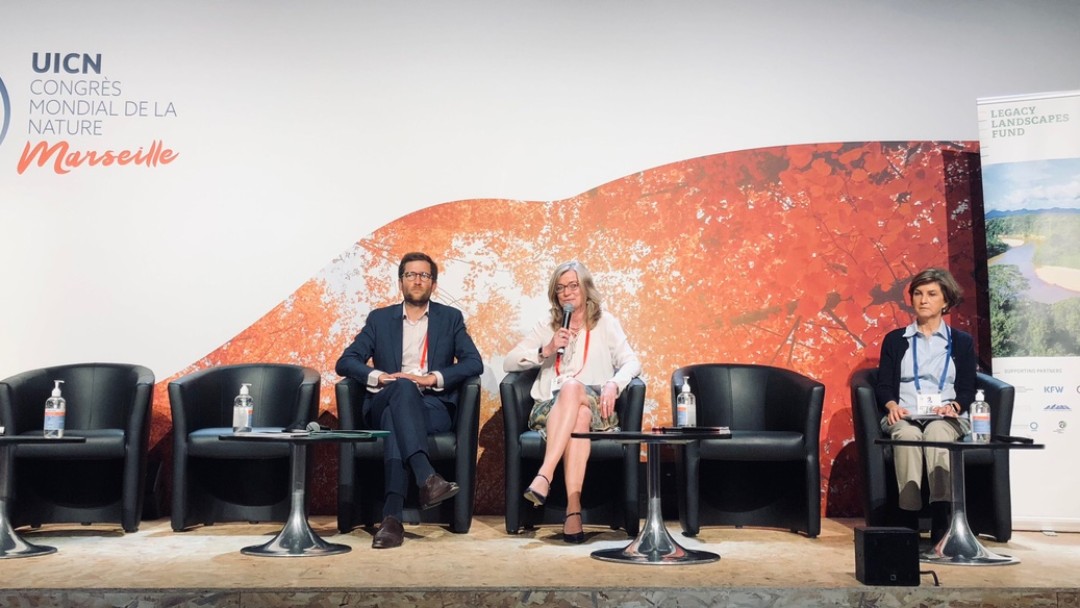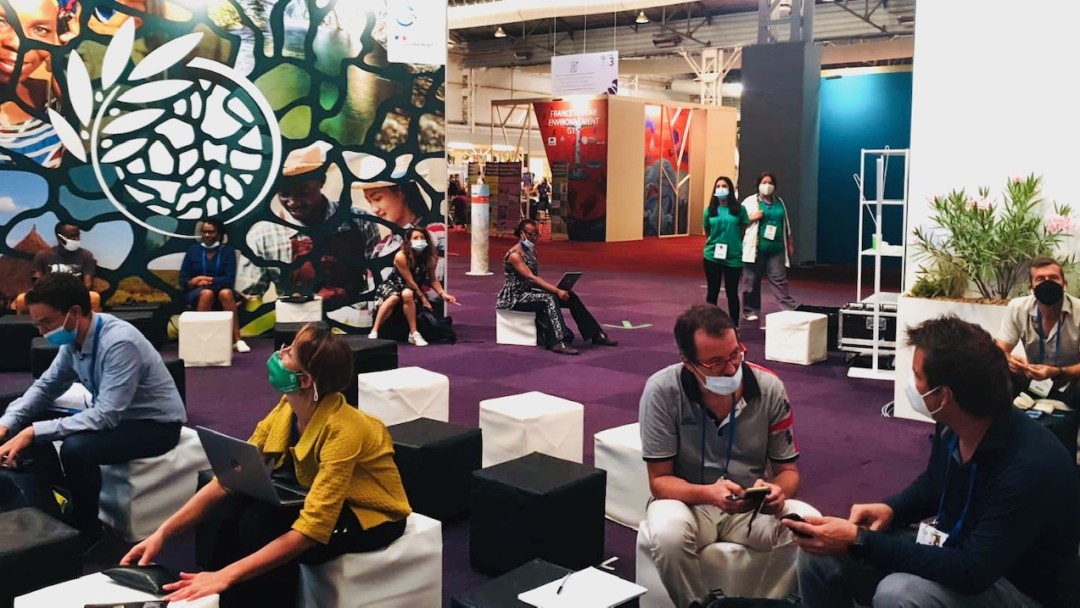News from 2021-09-09 / KfW Development Bank
KfW at biodiversity congress in Marseille
Christiane Laibach, a member of KfW’s Executive Board, attended the IUCN World Conservation Congress, where she highlighted a number of initiatives aimed at preserving biodiversity.

From 3 September in Marseille, experts from around the world came together for the IUCN World Conservation Congress to look for ways to stop the worrying decline in biodiversity. The loss of species has accelerated in recent years and now reached levels that are far beyond acceptable, with a new species dying out forever every 11 minutes on average. As one of the world’s largest donors to biodiversity conservation causes, KfW was also in attendance in Marseille, where it drew attention to some of its latest initiatives.
Executive Board member Christiane Laibach spent four days at the event, which gave her an opportunity to talk about activities such as KfW’s work with the Legacy Landscapes Fund (LLF). This is an innovative funding tool that brings together public and private donors to provide lasting and reliable support to some of the most important biodiversity hotspots in developing countries.
80% of biodiversity is concentrated on 20% of the Earth’s surface and is predominantly found in poorer areas of the world, where they often do not have the means necessary for effective conservation. The LLF is trying to close this gap. KfW Development Bank has provided an initial EUR 82.5 million of start-up funding on behalf of the German Federal Government. In a video message to the IUCN Congress, Germany’s Federal Minister for Economic Cooperation and Development, Gerd Müller, announced a further payment amounting to almost EUR 40 million.
A fund that mobilises private money
Various philanthropic donors such as the Gordon and Betty Moore Foundation are also involved, meaning that the LLF currently has close to EUR 155 million in available funds. There are plans to attract further private and public donors and raise a total of EUR 1 billion by 2030. This could secure long-term funding for at least 30 of the world’s most biodiverse areas, preserving valuable biodiversity for our whole planet.

Christiane Laibach spoke to a sizable audience about the LLF in Marseille, along with the former prime minister of Ethiopia, Hailemariam Desalegn, the deputy CEO of the French development agency, Bertrand Walckenaer, the Executive Director of the LLF, Stefanie Lang, and a number of other international figures.
Laibach noted some of the fund’s attributes that she particularly values: that it is flexible and globally applicable, that it brings together private and philanthropic partners, that it secures funding for the long term and that it involves the local population. “Thanks to the LLF, we are taking a major step forward when it comes to preserving biodiversity.” She also took the opportunity to invite other donors to join this extraordinary fund and work together to do even more for the cause of wildlife conservation.
Support for conservation in southern Africa
In addition, Laibach gave the starting signal for a new facility for transfrontier conservation areas in southern Africa. KfW has set up this Transfrontier Conservation Financing Facility (TFCA FF) on behalf of the German Federal Government together with the Southern African Development Community (SADC), a regional organisation. Similar to the LLF with the exception that it only operates regionally, the facility is intended to ensure conservation areas are on a solid revenue footing.
This is particularly urgent at the moment because many parks are suffering badly from the loss of tourism revenue due to the coronavirus pandemic, which has resulted in a drop of up to 85%. Germany is contributing EUR 23 million to the TFCA FF, with other donors to follow. Malawi’s Minister for Forestry and Natural Resources, Nancy Tembo, praised the facility as “a great asset” for the whole region.

Species conservation is just as important as climate action
According to the organisers, more than 4,000 biodiversity experts from all over the world attended the IUCN Congress, with another 3,400 taking part online. The event was opened by French president Emmanuel Macron, European Commission vice-president Frans Timmermans, ECB President Christine Lagarde, and actor and environmentalist Harrison Ford, among others. They all advocated for speedy action to protect biodiversity more effectively and for ambitious international targets to be agreed upon for this purpose.
Scientists recommend that 30% of the Earth’s surface should be placed under protection by 2030 (known as the 30x30 goal). Christiane Laibach, who was also present at the opening ceremony, said: “At the next Conference of the Parties (COP) to the Convention on Biological Diversity in Kunming, China, we need a clear signal that species conservation is just as important as mitigating climate change. We need a Paris effect.”

Share page
To share the content of this page with your network, click on one of the icons below.
Note on data protection: When you share content, your personal data is transferred to the selected network.
Data protection
Alternatively, you can also copy the short link: https://www.kfw-entwicklungsbank.de/s/enzBWrMC.CjwA
Copy link Link copied